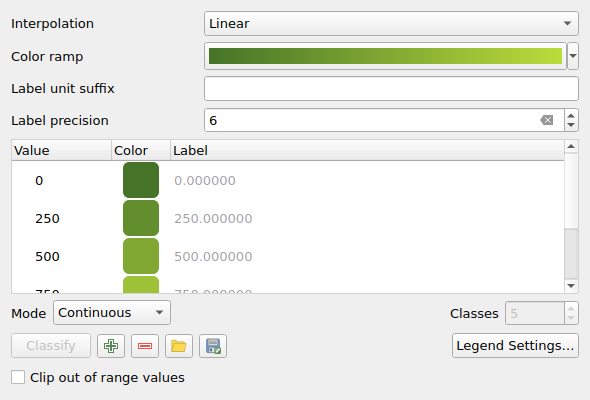Class: QgsColorRampShaderWidget¶
A widget for configuring numeric ranges associated with a color ramp.
It has 2 ways how to use it. For raster layers, raster data provider and band is assigned and the Quantile classification mode can be used and the LoadFromBandButton is visible.
The other mode is used to style mesh layer contours (scalar datasets)
Added in version 3.4.

QgsColorRampShaderWidget¶
Class Hierarchy¶
Base classes¶
- class qgis.gui.QgsColorRampShaderWidget[source]¶
Bases:
QWidget- __init__(parent: QWidget | None = None)
Creates new color ramp shader widget
- Parameters:
parent (Optional[QWidget] = None)
- signal classificationModeChanged[source]¶
pyqtSignal(*types, name: str = …, revision: int = …, arguments: Sequence = …) -> PYQT_SIGNAL
types is normally a sequence of individual types. Each type is either a type object or a string that is the name of a C++ type. Alternatively each type could itself be a sequence of types each describing a different overloaded signal. name is the optional C++ name of the signal. If it is not specified then the name of the class attribute that is bound to the signal is used. revision is the optional revision of the signal that is exported to QML. If it is not specified then 0 is used. arguments is the optional sequence of the names of the signal’s arguments.
- initializeForUseWithRasterLayer(self)[source]¶
Allows quantile classification mode for raster layers
- signal minimumMaximumChangedFromTree[source]¶
pyqtSignal(*types, name: str = …, revision: int = …, arguments: Sequence = …) -> PYQT_SIGNAL
types is normally a sequence of individual types. Each type is either a type object or a string that is the name of a C++ type. Alternatively each type could itself be a sequence of types each describing a different overloaded signal. name is the optional C++ name of the signal. If it is not specified then the name of the class attribute that is bound to the signal is used. revision is the optional revision of the signal that is exported to QML. If it is not specified then 0 is used. arguments is the optional sequence of the names of the signal’s arguments.
- populateColormapTreeWidget(self, colorRampItems: Iterable[QgsColorRampShader.ColorRampItem])[source]¶
Populates color ramp tree from ramp items
- Parameters:
colorRampItems (Iterable[QgsColorRampShader.ColorRampItem])
- setExtent(self, extent: QgsRectangle)[source]¶
Sets extent, only when used for raster layer
- Parameters:
extent (QgsRectangle)
- setFromShader(self, colorRampShader: QgsColorRampShader)[source]¶
Sets widget state from the color ramp shader
- Parameters:
colorRampShader (QgsColorRampShader)
- setMinimumMaximum(self, minimum: float, maximum: float)[source]¶
Sets min max
- Parameters:
minimum (float)
maximum (float)
- setMinimumMaximumAndClassify(self, minimum: float, maximum: float)[source]¶
Sets min max and classify color tree
- Parameters:
minimum (float)
maximum (float)
- setRasterBand(self, band: int)[source]¶
Sets raster band, only when used for raster layer
- Parameters:
band (int)
- setRasterDataProvider(self, dp: QgsRasterDataProvider | None)[source]¶
Associates raster with the widget, only when used for raster layer
- Parameters:
dp (Optional[QgsRasterDataProvider])
- shader(self) QgsColorRampShader[source]¶
Returns shared function used in the renderer
- Return type:
- signal widgetChanged[source]¶
pyqtSignal(*types, name: str = …, revision: int = …, arguments: Sequence = …) -> PYQT_SIGNAL
types is normally a sequence of individual types. Each type is either a type object or a string that is the name of a C++ type. Alternatively each type could itself be a sequence of types each describing a different overloaded signal. name is the optional C++ name of the signal. If it is not specified then the name of the class attribute that is bound to the signal is used. revision is the optional revision of the signal that is exported to QML. If it is not specified then 0 is used. arguments is the optional sequence of the names of the signal’s arguments.